בין קניה ומדינת ישראל מתקיים לאורך השנים קשר חזק ופורה המבוסס על ידידות הדדית, כבוד ואמון. מערכת יחסים זו הוכיחה את ערכה באמצעות אירועים היסטוריים רבים ונשארה איתנה בשל דיאלוג חיובי מתמשך ושיתוף פעולה דו-צדדי.
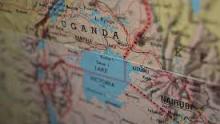
In 1903, Theodor Herzl sought the support of great powers for a Jewish homeland, leading him to approach British colonial secretary Joseph Chamberlain. They agreed in principle to Jewish settlement in East Africa. At the Sixth Zionist Congress on August 26, 1903, Herzl proposed the British Uganda Program as a refuge for Jews in immediate danger in Russia. A lesser-known fact is that most of the proposed territory was actually in what is now Kenya. The congress voted 295-178 to send an investigatory commission. Shortly after, the British government allocated a "Jewish territory" in East Africa under conditions allowing Jews to observe their customs.

Israel Somen (1903 – 9 October 1984), also known as Issy Somen, was a Jewish Kenyan politician, businessman, and diplomat. He served as Mayor of Nairobi in 1955 and later as Israel's Honorary Consul to Kenya. Somen played a pivotal role in fostering positive relations between Kenya and Israel, both before and after Kenya's independence. His family emigrated to Kenya in the early 20th century, establishing successful businesses. Somen, who was also president of the Nairobi Hebrew Congregation, lived in Kenya for over 40 years before relocating to Switzerland.
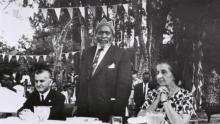
Kenya gains Independence & Israel opens an Embassy in Nairobi marking the start of diplomatic relations between the two countries.
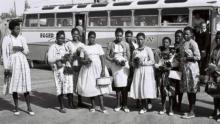
The first groups of MASHAV trainees from Kenya arrived in Israel
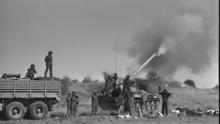
In the aftermath of the 1973 Yom Kippur War, Kenya made the decision to sever diplomatic ties with Israel. The conflict resulted in significant tensions within the international community. Kenya's decision to cut diplomatic relations with Israel was influenced by the political dynamics of the time, including pressure from other African nations and the Arab League. This move marked a significant shift in Kenya's foreign policy stance towards the Middle East. However, diplomatic relations between Kenya and Israel were eventually restored, reflecting evolving geopolitical realities and diplomatic initiatives aimed at fostering regional stability.

During the daring Entebbe rescue operation in 1976 Kenyan authorities allowed Israeli planes to refuel on their territory despite severing ties with Israel several years earlier. This critical gesture of cooperation provided essential logistical support for the rescue mission, which aimed to free Israeli hostages held by terrorists in Uganda. Considering the delicate political climate at the time, Kenya's decision to facilitate the refueling demonstrated a pragmatic approach and willingness to support Israel during a challenging time. This act of assistance played a pivotal role in the success of the mission and underscored the deep rooted ties between the countries, even throughout the years of diplomatic tensions.
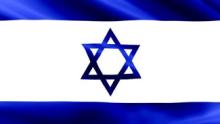
With the resumption of diplomatic ties in addition to the many Kenyans traveling to Israel for training, Israeli experts arrived in Kenya to hold “on the spot” courses in various fields for large groups of trainees. This cooperation diversified into large-scale projects, which were a welcome addition to the efforts being made by private Israeli companies to advance Kenya’s infrastructure.

In 1993, Kenya and Israel took a significant step towards rebuilding their diplomatic ties, marking a new chapter in their relationship. The re-establishment of diplomatic relations came after years of strained interactions following Kenya's decision to sever ties with Israel in the aftermath of the 1973 Yom Kippur War. The renewed diplomatic relations signaled a mutual commitment to dialogue, cooperation, and partnership between the two nations. This move paved the way for increased collaboration across various sectors, especially in agriculture and construction, leading to many Israeli companies to bring their business to Kenya and benefiting both countries.

On November 28, 2002, Mombasa, Kenya, experienced a two-pronged terrorist attack targeting Israeli entities. An all-terrain vehicle crashed through a barrier at the Israeli-owned Paradise Hotel, exploding and killing 13 people while injuring 80. Simultaneously, attackers fired two surface-to-air missiles at an Arkia Airlines charter plane, which narrowly escaped damage and safely landed without any casualties. In response, the Kenyan government launched an immediate investigation, condemning the attacks and pledging to enhance security measures to prevent future incidents.
